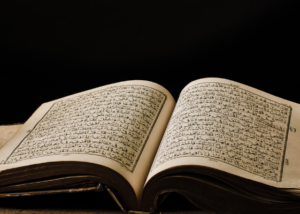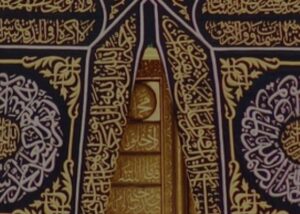Quran
Hadith
Islamic Text
بِسْمِ اللَّهِ الرَّحْمَنِ الرَّحِيمِ
In the Name of Allah Most Merciful Most Kind
Short Answer
Sufi dancing (Hadra) has not been mentioned explicitly in the Holy Quran. However, many leading scholars of Ahl al-Sunnah have used specific verses as proof for the Prohibition of the Hadra (the Sufi dance).
Imitating the worship of Kuffar
وَمَا كَانَ صَلَاتُهُمْ عِنْدَ الْبَيْتِ إِلَّا مُكَاءً وَتَصْدِيَةً فَذُوقُوا الْعَذَابَ بِمَا كُنْتُمْ تَكْفُرُونَ
Their prayer at the house was nothing but clapping and shouting. So, taste the punishment for your Kufr (disbelief). (Surah al-Anfal, 35).
The Quranic verse above is one of several verses cited by scholars when substantiating the prohibition of the Hadra (Sufi dance). In the Nusoos (texts) below, we find Imams al-Qurtubi and Ibn Rajab al-Hanbali both commenting upon the verse above when asserting the prohibition of Sufi dancing (Hadra).
قَتَادَةُ: الْمُكَاءُ ضَرْبٌ بِالْأَيْدِي، وَالتَّصْدِيَةُ صِيَاحٌ. وَعَلَى التَّفْسِيرَيْنِ فَفِيهِ رَدٌّ عَلَى الْجُهَّالِ مِنَ الصُّوفِيَّةِ الَّذِينَ يَرْقُصُونَ وَيُصَفِّقُونَ وَيُصْعَقُونَ. وَذَلِكَ كُلُّهُ مُنْكَرٌ يَتَنَزَّهُ عَنْ مِثْلِهِ الْعُقَلَاءُ، وَيَتَشَبَّهُ فَاعِلُهُ بِالْمُشْرِكِينَ فِيمَا كَانُوا يَفْعَلُونَهُ عِنْدَ الْبَيْتِ. (الجامع لأحكام القرآن)
Qatada said, al-Mukaa is to strike the hands (together) and al-Tasdiyah is to shout. With either of the two interpretations, it is a refutation against the ignorant Sufis who dance, clap, and fall unconscious. All of which is an abomination that people with intellect refrain from. The one who does these things is imitating the Mushriks (polytheists) in what they used to do at the House (Ka’bah). (Imam Abu Abd Allah al-Qurtubi, Tafseer al-Qurtubi).
فَمَنْ تَقَرَّبَ إِلَى اللَّهِ بِعَمَلٍ لَمْ يَجْعَلْهُ اللَّهُ وَرَسُولُهُ قُرْبَةً إِلَى اللَّهِ، فَعَمَلُهُ بَاطِلٌ مَرْدُودٌ عَلَيْهِ، وَهُوَ شَبِيهٌ بِحَالِ الَّذِينَ كَانَتْ صَلَاتُهُمْ عِنْدَ الْبَيْتِ مُكَاءً وَتَصْدِيَةً، وَهَذَا كَمَنْ تَقَرَّبَ إِلَى اللَّهِ تَعَالَى بِسَمَاعِ الْمَلَاهِي، أَوْ بِالرَّقْصِ. (جامع العلوم والحكم في شرح خمسين حديثا من جوامع الكلم)
Whoever worships Allah (Most High) by doing something that Allah and His Messenger ﷺ have not decreed an act of worship to Allah, then his action is invalid and rejected. They imitate those whose prayers at the house were Mukaa (clapping) and Tasdiyah (shouting). This is like the one who worships Allah Almighty by listening to music or by dancing. (Imam Ibn Rajab al-Hanbali, Jami al-Uloom).
Hanafi scholars
فَأَخْرَجَ لَهُمْ عِجْلًا جَسَدًا لَهُ خُوَارٌ فَقَالُوا هَذَا إِلَهُكُمْ وَإِلَهُ مُوسَى فَنَسِيَ
So, he forged for them a calf which produced a sound. They said, this is your god and the god of Musa, but he forgot. (Surah TaHa, 88).
The Hanafi Imams, al-Birgivi and al-Khadimi, both made reference to the verse regarding the calf Bani Israel worshipped when speaking about the prohibition upon Sufi dancing (Hadra). They also cited al-Tataarkhaniyah, which is a renowned and authoritative Hanafi legal text.
It is important to note that they were speaking about dancing in the context of worship. Therefore, it is not correct to say that they were opposed to dancing in a generic sense. And they did not oppose it when it is carried out as an act of Ibadah. Such a presumption would also be incorrect since legal rulings related to Ibadah (worship) tend to be stricter than general rules.
(فَهُوَ) أَيْ الرَّقْصُ (دِينُ الْكُفَّارِ وَعُبَّادِ الْعِجْلِ وَقَالَ فِي التَّتَارْخَانِيَّة) هَذَا دَلِيلٌ عَلَى حُرْمَةِ الرَّقْصِ عَلَى مَذْهَبِ الْحَنَفِيَّةِ. (بريقة محمودية في شرح طريقة محمدية)
It, dancing, is the religion of the disbelievers (Kufaar) and calf-worshippers. He said in al-Tataarkhaniyah: This is evidence for the prohibition of dancing according to the Hanafi Madhab (school of jurisprudence). (Imam Abu Saeed al-Khadimi, Bareeqah Mahmoodiyah fi Sharh Tariqah Muhammadiyah).
Another verse
وَلَا تَمْشِ فِي الْأَرْضِ مَرَحًا
And do not walk upon the earth haughtily. (Surah al-Isra, 37).
The Holy Quran encourages people to walk gently upon the Earth. The opposite is considered to be arrogant. Some scholars cited this when opposing Sufi dancing. Personally, I do not believe this is the clearest or best evidence against the Hadra. However, it has been cited by major scholars of Ahl al-Sunnah:
وقال أبو الوفاء بن عقيل قد نص القرآن على النهي عن الرقص فقال عز وجل لا تمش في الأرض مرحا وذم المختال فقال الله تعالى إنه لا يحب كل مختال فخور والرقض أشد المرح والبطر. (تلبيس إبليس)
Abu Al-Wafa bin Aqeel said: The Quran has asserted the prohibition of dancing. Allah, Mighty and Majestic, said: And do not walk upon the earth haughtily. He (Most High) condemned the arrogant. He Most High said: He does not like the arrogant and the haughty. Dancing is extreme haughtiness and falsehood. (Imam Abd al-Rahman bin al-Jowzi, Talbees Ibless).
قَالَ أَبُو الْفَرَجِ بْنُ الْجَوْزِيِّ، وَقَدْ قَالَ الْقَفَّالُ مِنْ أَصْحَابِنَا: لَا تُقْبَلُ شَهَادَةُ الْمُغَنِّي وَالرَّقَّاصِ. قَالَ أَبُو عَبْدِ اللَّهِ الْقُرْطُبِيُّ – رَحِمَهُ اللَّهُ -: وَإِذْ قَدْ ثَبَتَ أَنَّ هَذَا الْأَمْرَ لَا يَجُوزُ فَأَخْذُ الْأُجْرَةِ عَلَيْهِ لَا يَجُوزُ، وَقَدْ ادَّعَى أَبُو عُمَرَ بْنُ عَبْدِ الْبَرِّ الْإِجْمَاعَ عَلَى تَحْرِيمِ الْأُجْرَةِ عَلَى ذَلِكَ، ذَكَرَ الْقُرْطُبِيُّ أَيْضًا فِي سُورَةِ سُبْحَانَ فِي قَوْله تَعَالَى {وَلا تَمْشِ فِي الأَرْضِ مَرَحًا} [الإسراء: 37] قَالَ: اسْتَدَلَّ الْعُلَمَاءُ بِهَذِهِ الْآيَةِ عَلَى ذَمِّ الرَّقْصِ وَتَعَاطِيهِ. (المدخل)
Abu al-Faraj bin al-Jowzi said: al-Qaffal, one of our companions, said: The testimony of the singer and dancer is not accepted. Abu Abdillah al-Qurtubi, may Allah have mercy upon him, said: Since it has been proven that this matter is not permissible, then taking payment for it is not permissible.
Abu Umar bin Abd al-Barr claimed consensus upon the prohibition of payment for it. Al-Qurtubi also commented in Surah Subhan, regarding the Almighty’s saying, And do not walk upon the earth haughtily. [Al-Isra: 37]. He said: The scholars considered this verse evidence for the condemnation of dancing and approaching it. (Imam Ibn al-Haaj, al-Madkhal).
As you can see above, none of the Quranic verses cited have directly mentioned the Sufi dance (Hadra). Therefore, it is not correct to say that the Hadra itself has been explicitly prohibited in the Holy Quran. Rather, certain verses of the Quran mention the worship of disbelievers, or the actions of sinners. Such verses have been considered as evidence against the Hadra (Sufi dance) by leading Imams of Ahl al-Sunnah.
The issue of Bidah (innovation)
As well as the more specific verses above, general verses prohibiting religious innovation (Bidah) can also be cited when opposing the Hadra. This is because many senior scholars considered the Hadra (Sufi dance) to be a Bidah. The prohibition upon religious innovation (Bidah) is explicit and frequent in the Holy Quran.
There are numerous scholars of Tafseer who have mentioned the prohibition of Sufi Dancing in their works. However, I have not focused on such texts because they do not always cite a particular verse of the Holy Quran. I will provide one such example below. Imam al-Qurtubi mentioned the Fatwa of Imam Abu Bakr al-Turtusi in his celebrated Tafseer.
مَذْهَبُ الصُّوفِيَّةِ بَطَالَةٌ وَجَهَالَةٌ وَضَلَالَةٌ، وَمَا الْإِسْلَامُ إِلَّا كِتَابُ اللَّهِ وَسُنَّةُ رَسُولِهِ، وَأَمَّا الرَّقْصُ وَالتَّوَاجُدُ فَأَوَّلُ مَنْ أَحْدَثَهُ أَصْحَابُ السَّامِرِيِّ، لَمَّا اتَّخَذَ لَهُمْ عِجْلًا جَسَدًا لَهُ خُوَارٌ قَامُوا يَرْقُصُونَ حَوَالَيْهِ وَيَتَوَاجَدُونَ، فَهُوَ دِينُ الْكُفَّارِ وَعُبَّادِ الْعِجْلِ.
وَلَا يَحِلُّ لِأَحَدٍ يُؤْمِنُ بِاللَّهِ وَالْيَوْمِ الْآخِرِ أَنْ يَحْضُرَ مَعَهُمْ، وَلَا يُعِينَهُمْ عَلَى بَاطِلِهِمْ، هَذَا مَذْهَبُ مَالِكٍ وَأَبِي حَنِيفَةَ وَالشَّافِعِيِّ وَأَحْمَدَ بْنِ حَنْبَلٍ وَغَيْرِهِمْ من أئمة المسلمين وبالله التوفيق. (الجامع لأحكام القرآن)The Sufi position is idleness, ignorance, and misguidance. Islam is nothing but the Book of Allah (Most High) and the Sunnah of His Messenger ﷺ. As for dancing and mystification, it was first introduced by the companions of al-Samiry. That was when he forged for them a calf which produced a sound. They danced around it and were mystified. That is the religion of the Kufar (disbelievers) and the worshipers of the calf.
It is not permissible for anyone who believes in Allah (Most High) and the Last Day to attend with them. Nor can one assist them in their falsehood. This is the Madhab of Malik, Abu Hanifa, al-Shafi’, Ahmad bin Hanbal and other Imams of the Muslims. And through Allah (alone) is facilitation (Towfeeq). (Imam Abu Abd Allah al-Qurtubi, Tafseer al-Qurtubi).
Conclusion
The presentation above supports the Hanafi position on the Hadra (Sufi dance). The Hanafis considered the Hadra to be prohibited. If a Madhab from the four accepted schools of Fiqh within Ahl al-Sunnah holds a different opinion then that should be respected. One should also look at the presentation of evidence provided by such scholars.
And Allah Most High Knows Best.
–Answered by Shaykh Noorud-deen Rashid (30.01.24)






